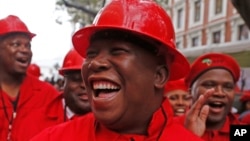The controversial South African politician Julius Malema has released a book entitled The Coming Revolution. Malema surprised everyone when his new Economic Freedom Fighters party took nearly 10 percent of the vote in this year's elections. The book and political ambitions of the young militant is causing worry within political circles.
The book titled The Coming Revolution: Julius Malema and the Fight for Economic Freedom, portrays Julius Malema and his party as the answer to South Africa's socio-economic problems.
Those problems include corruption, unemployment of at least 25 percent, poorly operating schools and chronic financial inequality 20 years after the end of apartheid.
Speaking at the book launch in July, Malema repeated his populist stance. "In everything else we do, we seek to achieve economic freedom in our lifetime and that is a strategic vision of the EFF, which we want all members of the EFF to internalize and appreciate," he said.
Economic freedom - as defined by the EFF - would be achieved through a socialist approach that includes nationalization of mines and banks, and the expropriation of land without compensation.
In the book, which was not actually written by Malema, he does not hide his anger and hatred for whites. He said they must return the land that they, in his words, stole from the South African black majority.
The message resonates with some South African blacks, who are increasingly disillusioned by the failure of the ruling African National Congress party to deliver basic services, and by seeing the party of the late Nelson Mandela named in one corruption scandal after another.
Malema himself has had his share of scandals, including being arrested and charged with fraud, tax evasion, money-laundering and racketeering.
But his appeal to the poor is undeniable, and that is what has more established political circles and analysts concerned. That, and the anger in the message, his confrontational style and potential for violence.
"The continuation to remove EFF from legislature, through wrong rulings. We will fight. They must never undermine us and take us for granted and think we are kids. We contested the elections. We have got the mandate of our people and no one should play with that mandate. We are warning them," Malema said.
In just his first week in parliament, Malema was thrown out of the chamber for refusing to withdraw a statement in which he said the ANC killed 34 miners who were shot dead by police during strikes in Marikana in 2012.
In a separate incident, EFF representatives in the Gauteng Province legislature were evicted by police for coming into session wearing red overalls and domestic workers clothes. EFF supporters retaliated with a protest in which they forced their way into the legislature, damaging property and looting.
This behavior has political leaders worried.
ANC Secretary-General Gwede Mantashe is as blunt as Malema in terms of his disapproval of the EFF's actions - known by their uniforms of red shirts and berets:
"If you begin to see the behavior in parliament today, I can tell you there is a formation that is getting into that space that I think in all forms -- it is Nazi-ist and fascist. It is using uniforms to mobilize in the same way that Hitler used the brown shirts to mobilize," stated Mantashe.
But at some point, analysts suggest, the EFF must start delivering substance with their new mandate, or risk losing support.
"I think that people are looking at the EFF in parliament, and, in every other platform, to see whether it has a feasible and viable alternative program that is potentially economically prosperous. And at this point the EFF has not demonstrated that," said Gideon Chitanga, a Johannesburg-based political researcher at the Centre for Study of Democracy.
While the EFF celebrates one year as a party -- with slogans such as "we have arrived, we are here to stay, ours is an unstoppable revolution" - Chitanga said history shows that similar socialist platforms and threats to the rule of law have ultimately failed in the modern world.
